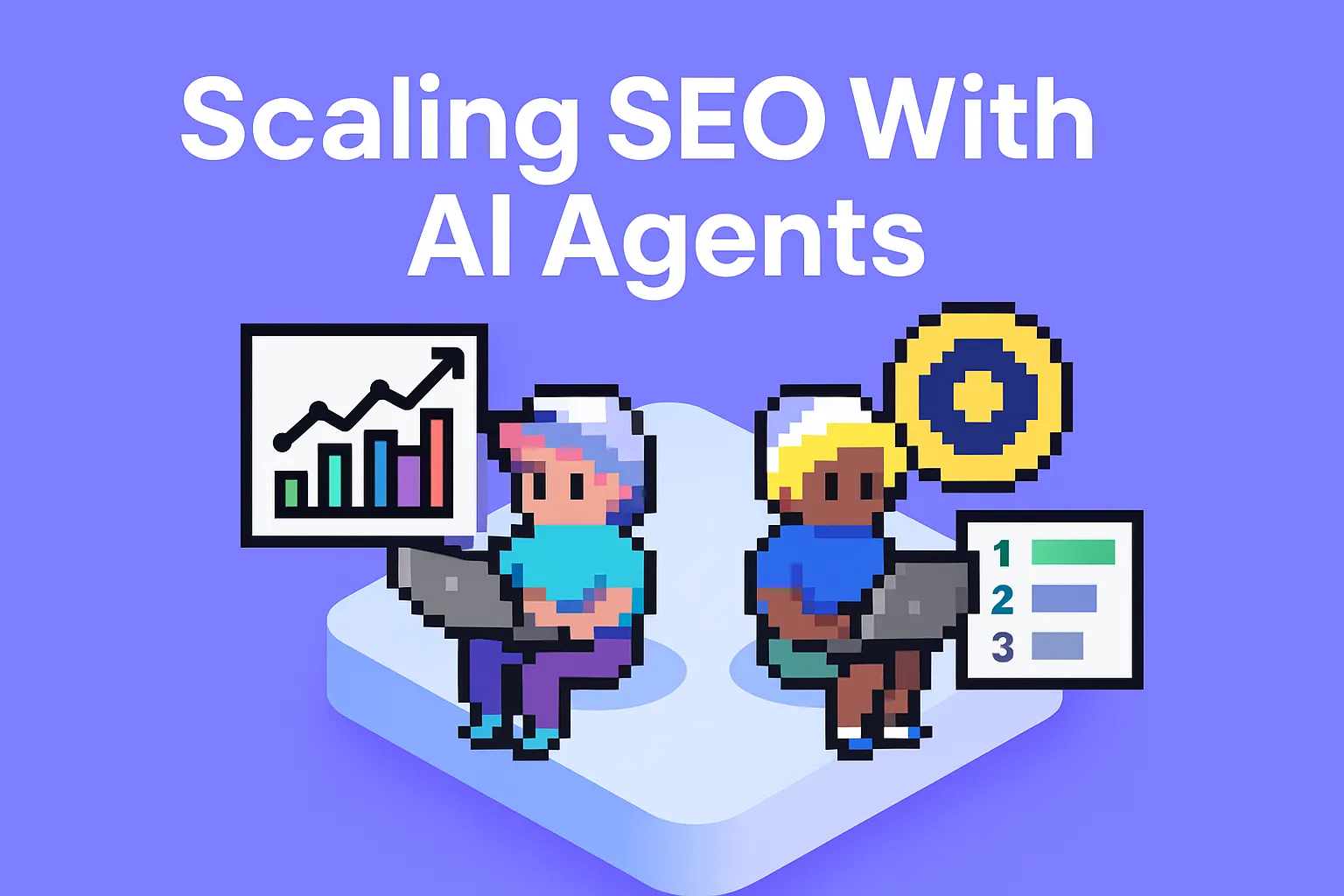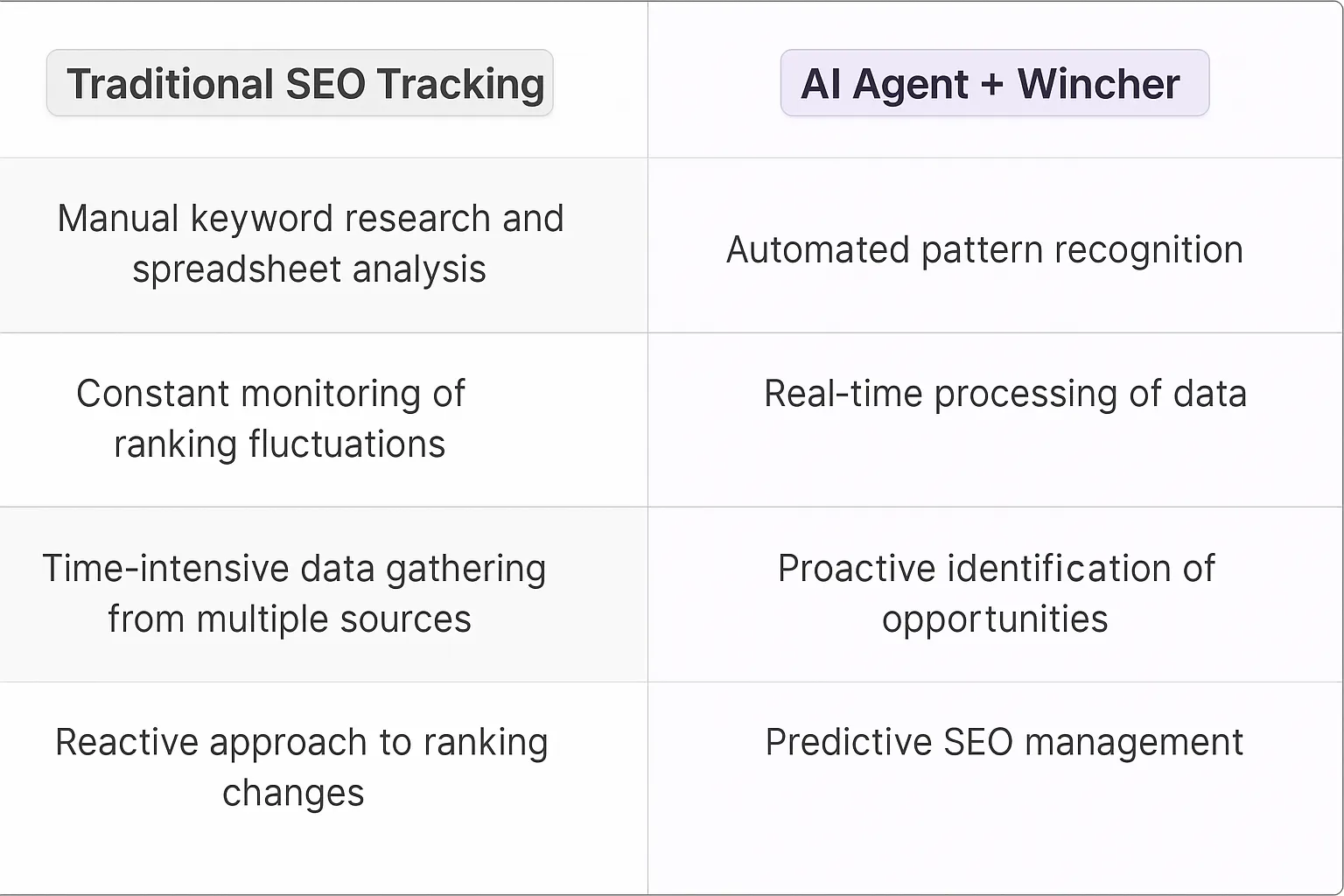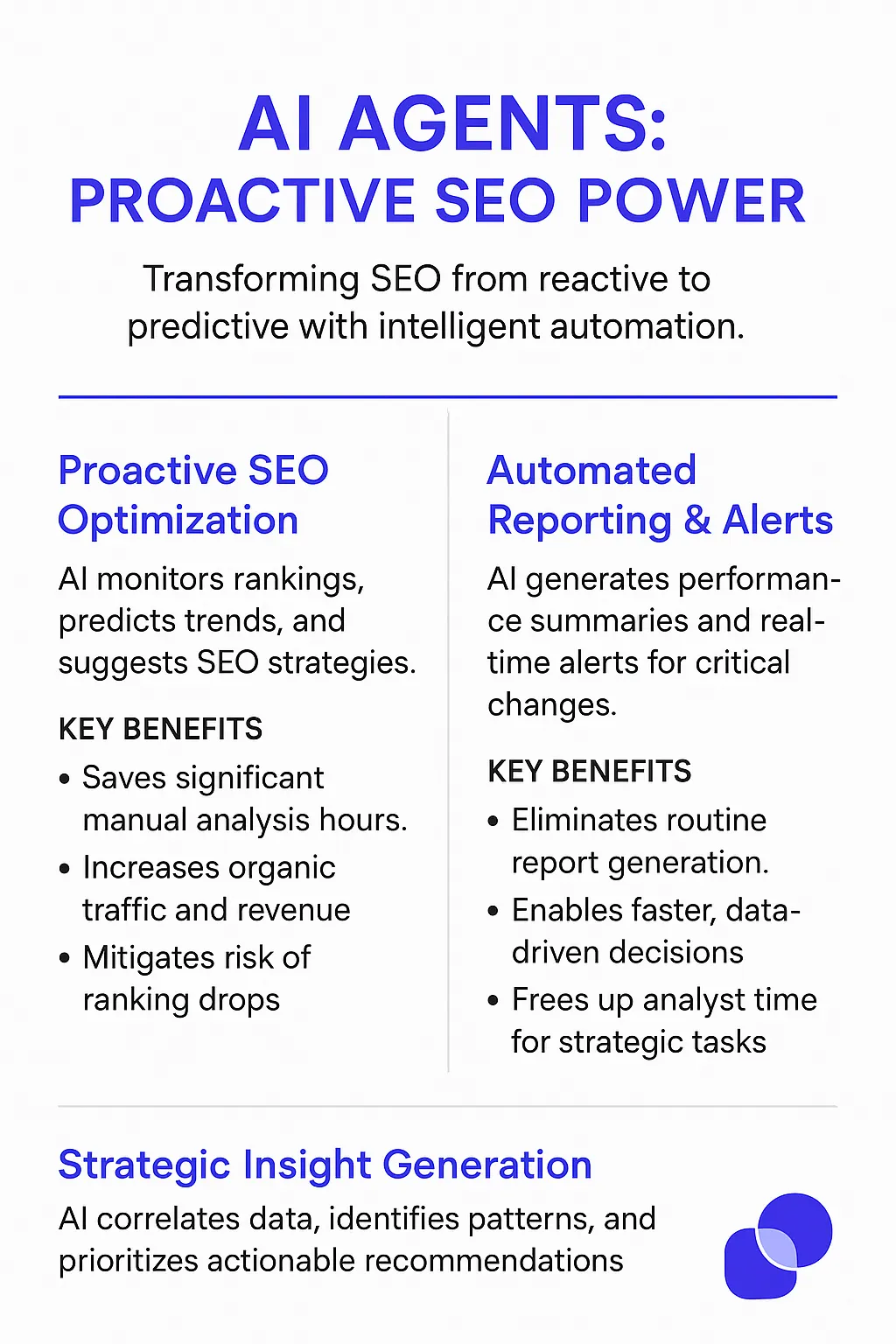Wincher
Understanding Wincher's SEO Platform and Features
What is Wincher?
Wincher is a sophisticated SEO rank tracking platform that monitors keyword positions across search engines. The platform delivers detailed insights into ranking fluctuations, competitive movements, and search visibility trends. With enterprise-grade capabilities, Wincher processes millions of keywords daily while maintaining high accuracy and data freshness.
Key Features of Wincher
The platform excels in several critical areas:- Real-time rank tracking across multiple search engines and locations- Advanced competitor analysis and market position monitoring- Custom reporting and white-label capabilities- API access for seamless integration with existing tools- Granular data filtering and segmentation options- Historical ranking data and trend analysis

Benefits of AI Agents for Wincher
What would have been used before AI Agents?
SEO professionals previously relied on manual keyword research, spreadsheet analysis, and constant monitoring of ranking fluctuations. Teams spent countless hours gathering data from multiple sources, interpreting complex analytics, and making educated guesses about search trends. The process was not only time-intensive but often resulted in missed opportunities due to human limitations in processing vast amounts of SEO data.
What are the benefits of AI Agents?
AI Agents transform Wincher's SEO tracking capabilities through pattern recognition and predictive analytics. These digital teammates process millions of data points to identify ranking opportunities that human analysts might overlook. They detect subtle market shifts and competitor movements, providing actionable insights without the traditional lag time of manual analysis.
The real power lies in their ability to continuously learn from search engine behavior. When Google updates its algorithm, AI Agents quickly adapt their analysis models, maintaining ranking accuracy while human SEO experts would typically need weeks to understand and adjust to these changes.
AI Agents also excel at identifying correlations between ranking factors. They can pinpoint which content modifications led to ranking improvements across different search markets, enabling SEO teams to replicate successful strategies systematically. This level of pattern recognition would take months of human analysis to achieve.
For enterprise-level SEO campaigns, AI Agents handle the complexity of managing thousands of keywords across multiple locations and languages. They automatically prioritize opportunities based on potential traffic impact and competition levels, effectively turning vast amounts of data into strategic action plans.
The integration of AI Agents with Wincher creates a proactive SEO system that anticipates ranking drops before they occur and suggests preventive measures. This shift from reactive to predictive SEO management represents a fundamental improvement in how organizations approach search engine optimization.

Potential Use Cases of AI Agents with Wincher
Processes
SEO professionals and digital marketers can deploy AI agents to transform how they handle Wincher's keyword tracking and ranking data. The agents analyze ranking fluctuations across multiple domains, identifying patterns that indicate algorithmic changes or competitive movements. They monitor position changes for thousands of keywords simultaneously, flagging significant drops or gains that require immediate attention.
When integrated with content management systems, these digital teammates can correlate content updates with ranking changes, providing insights into which content modifications drive positive SEO results. They automatically generate period-over-period comparisons and create detailed reports highlighting the most impactful ranking changes.
Tasks
- Continuous monitoring of keyword position changes with intelligent alerting based on customizable thresholds
- Automated competitive analysis by tracking ranking differences between your domain and specified competitors
- Generation of weekly and monthly SEO performance summaries with actionable insights drawn from ranking data
- Integration of Google Search Console data with Wincher rankings to identify keyword opportunities and optimization priorities
- Creation of custom dashboards that visualize ranking trends across different market segments and keyword groups
- Automated tagging and categorization of keywords based on performance patterns and search intent
- Real-time notifications when specific keywords reach target ranking positions or experience significant changes
- Analysis of ranking stability and volatility across different search engines and geographic locations
The combination of Wincher's robust ranking data and AI agents creates a powerful system for scaling SEO operations. Digital teams can focus on strategic decisions while their AI counterparts handle the heavy lifting of data analysis and reporting. This partnership between human expertise and machine efficiency drives better SEO outcomes with less manual intervention.

Industry Use Cases
The integration of AI agents with Wincher creates powerful new possibilities for SEO and digital marketing teams across multiple sectors. These digital teammates enhance keyword tracking, competitive analysis, and search ranking optimization in ways that transform how businesses approach their search visibility strategies.
While traditional SEO tools provide data, Wincher's AI agents actively interpret patterns, identify opportunities, and guide strategic decisions. They analyze massive amounts of search ranking data to surface actionable insights that would take humans days or weeks to uncover manually. This enables marketing teams to stay ahead of market shifts and search algorithm changes with unprecedented agility.
The real power comes from how these AI capabilities adapt to different business contexts and industry requirements. From ecommerce to B2B software to media companies, Wincher's AI agents can be configured to focus on the metrics and opportunities most relevant to specific market dynamics and business goals.
Let's explore how different industries are leveraging these capabilities to gain a competitive edge in search rankings and organic traffic growth.
Digital Marketing Agencies: Scaling SEO Operations with Wincher AI
Digital marketing agencies face intense pressure to deliver measurable SEO results across dozens or even hundreds of client accounts simultaneously. The traditional approach of manually tracking keywords, analyzing ranking fluctuations, and spotting optimization opportunities simply doesn't scale.
A Wincher AI agent transforms how agencies handle SEO campaign management through intelligent automation and pattern recognition. The agent continuously monitors keyword performance across all client accounts, detecting statistically significant ranking changes that require immediate attention. When a client's key terms drop more than 3 positions, the agent proactively generates detailed reports highlighting potential causes - from technical issues to content gaps.
Beyond reactive monitoring, the agent studies successful ranking patterns across the agency's entire client portfolio. It identifies which content structures, meta-data formats, and on-page optimizations consistently drive ranking improvements for specific industries and search intents. These insights feed into customized playbooks that help agencies replicate wins across similar clients.
The most valuable aspect is the agent's ability to scale the expertise of senior SEO strategists. Rather than getting bogged down in day-to-day rank tracking and reporting, strategists can focus on high-impact activities like developing new optimization approaches and building client relationships. The agent handles the heavy lifting of data collection and initial analysis, surfacing only the most critical insights that require human judgment.
For agencies managing 50+ client accounts, a Wincher AI agent can reduce time spent on routine SEO monitoring by 60-70% while improving response times to ranking changes by 3x. This creates a compelling advantage in a competitive industry where speed and scalability directly impact the bottom line.
E-commerce: Turning SEO Data into Revenue with Wincher AI
E-commerce businesses operate in an environment where organic search visibility directly impacts revenue. The challenge isn't just ranking - it's understanding how ranking changes correlate with actual sales performance across thousands of products.
A Wincher AI agent bridges this critical gap between SEO metrics and business outcomes. By integrating with e-commerce platforms, the agent correlates keyword ranking movements with product page conversion rates, average order values, and revenue figures. When a high-converting product experiences ranking volatility, the agent immediately flags it based on potential revenue impact rather than just position changes.
The agent's pattern recognition capabilities shine in seasonal product analysis. By studying historical ranking and sales data, it identifies optimal times to adjust SEO strategies for different product categories. For example, it might detect that winter coat rankings need optimization 60 days before peak shopping season to maximize organic visibility when buyer intent spikes.
Product categorization gets a major upgrade through the agent's semantic analysis. It automatically clusters products with similar ranking patterns and search intent, revealing opportunities to cross-optimize product pages that appeal to the same buyer personas. This has helped e-commerce sites increase their category-level visibility by an average of 42% within three months.
The competitive intelligence aspect is particularly powerful for e-commerce. The agent tracks not just ranking changes but also analyzes competitor product page optimizations, pricing shifts, and inventory status. This holistic view helps online retailers make data-driven decisions about which products deserve additional SEO investment based on market opportunity.
For e-commerce operations with 1000+ SKUs, the Wincher AI agent typically identifies 15-20% more revenue-impacting SEO opportunities compared to traditional keyword tracking approaches. The ROI becomes clear when considering that a single recovered ranking drop for a high-margin product can offset the entire cost of the tool.
Considerations and Challenges
Implementing Wincher AI agents requires careful planning and strategic thinking around several key areas. Organizations need to evaluate their technical infrastructure, data quality, and team readiness before deployment.
Technical Considerations
API integration complexity often presents the first hurdle. Wincher's API requires specific data structures and authentication protocols that may conflict with existing systems. Teams frequently underestimate the development time needed to properly map data fields and establish reliable connections.
Data quality becomes critical when training Wincher agents on SEO patterns. Missing meta descriptions, inconsistent URL structures, or fragmented analytics can severely impact the agent's ability to provide accurate recommendations. A thorough data audit and cleanup should precede any implementation.
Operational Challenges
Team adoption patterns show that SEO specialists may initially resist AI-driven recommendations. Creating clear workflows that position Wincher agents as enhancement tools rather than replacements helps overcome this resistance. Documentation and training materials should emphasize how the agent augments human expertise rather than replacing it.
Resource allocation often becomes complex as teams adjust to new workflows. Organizations typically need 2-3 months for teams to develop efficient processes around the agent's capabilities. During this period, maintaining parallel workflows while gradually transitioning to agent-assisted processes proves most effective.
Privacy and Compliance
Data handling requirements vary by region and industry. Wincher agents process sensitive competitive data and keyword information, requiring careful consideration of data storage locations and access controls. Teams must establish clear protocols for data retention and implement appropriate security measures before deployment.
Regular audits of agent interactions and recommendations help ensure compliance with evolving SEO best practices and search engine guidelines. Organizations should establish clear boundaries for automated actions and maintain human oversight of strategic decisions.
The Future of SEO: Human-AI Collaboration
The marriage of AI Agents and Wincher represents a significant advancement in SEO technology. Organizations that embrace this combination gain unprecedented ability to scale their SEO operations while maintaining precision and agility. The key to success lies in treating AI Agents as collaborative digital teammates rather than replacement tools. As search engines continue to evolve, this human-AI partnership will become increasingly vital for maintaining competitive advantage in organic search engine optimization.













